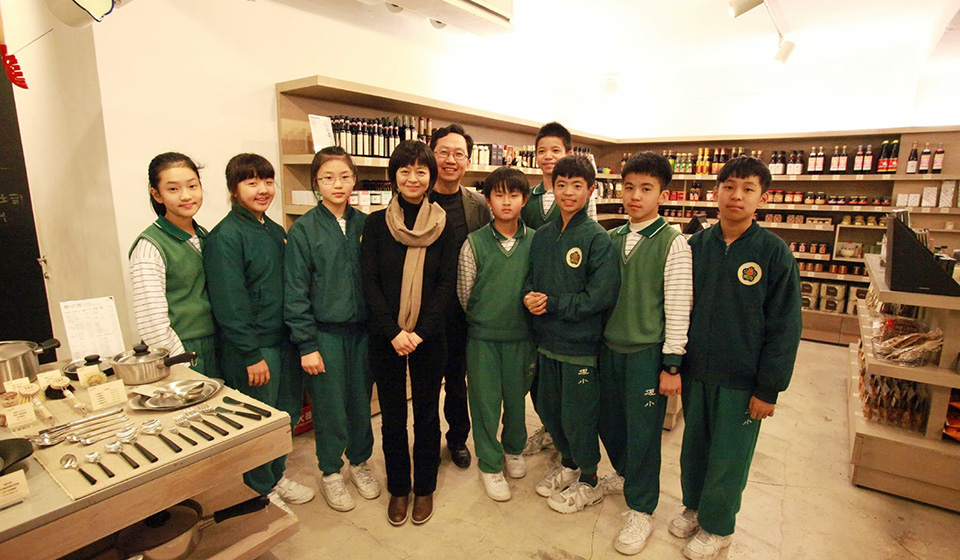| |
| |
|
|
|
|
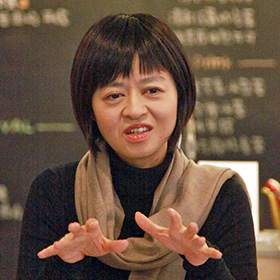 |
|
| |
Yi-lan Yeh
Experiences
- Famous travel writer and food critic in Taiwan.
- Born in Tainan, currently live in Taipei.
- Focus on travel, food, and local agricultural products, awarded as the “2004 Best Travel Writer” by the Magazine Review”, published over 10 books, including Marvelous Tasting, Original Taste, etc.
- Currently the Chief Editor of the Creative Publishing Department of Free Mind Corp., the member of Taipei City Government Tourism Committee, as well as the consultant to the Taipei City Government, the Cultural Affairs Bureau of Tainan City Government, the Council of Agriculture, the Tourism Bureau, the Department of Commerce, and Taipei City Government on activity and decision-making.
|
|
| |
|
|
| |
| Gourmet Masters |
(Shu-han) |
1) Food critic and travel writer
Time: March 11, 2014
Location: PEKOE Zakka Store
Introduction
We often see the articles by Ms. Yeh on newspapers and magazines about the dietary culture of different countries. While researching the fruits in Taiwan, we read the book Marvelous Tasting, and found that she is the spokeswoman of TAP (traceable agricultural products). Will she bring us new perspectives on agricultural products in Taiwan with her rich experience in food and travel? Are the fruits in Taiwan really our pride? What is the relationship between TAP and delicious food? How will she deal with the food safety problem? As she is knowledgeable about jam, we want to know her opinion on Red on Tree. We are very honored to interview Ms. Yeh.
Q1. What was your first job? How did you become a food critic? (Wei-tse)
A1. My job has always been related to writing. I once worked as a journalist and editor, later I specialized in food and travel writing. I am not only a writer, but also manage shop and websites, as well as teach. I am a “food critic”, rather than a “food player”.
Q2. What abilities should a food critic have? (Wei-tse)
A2. I think a food critic should have the following abilities: love and passion for food, desire for new knowledge and innovation ability, abilities to learn, taste, judge and distinguish food, writing ability with the writing style that can attract readers, individual ideals, and concerns for the environment and local tradition which is also a part of individual concept of the food critic.
Q3. You are the spokeswoman of many products, what made you decide to become the spokeswoman of those products? (Wei-tse)
A3. I will decide whether to act as the spokeswoman based on the following factors: my reliance of this product in daily life, trust in the product quality, understanding of the product content, and identity with the product concept.
Q4. You have been to so many countries and have tasted so many foreign foods, so which country have the most unforgettable and assured food for you? (Tsai-chen)
A4. Although I have traveled around and tasted the delicious food all over the world, the food and ingredients in Taiwan are the most intimate and unforgettable for me. Because I was born here, and grew up with the food here. There is a famous saying, “the food you eat decides the person you are.” Each farmland in Taiwan is cultivated diligently by the farmers, so I am often moved by the ingredients in Taiwan. I think there are food safety problems in all countries, and the whole world faces the food safety problem like Taiwan. At present, the science and technology are progressing, but they bring negative impacts on food. The food producers add additives in the food, making it delicious, but it does harm to human body. Therefore, there are always food safety problems no matter where we are.
| |
|
|
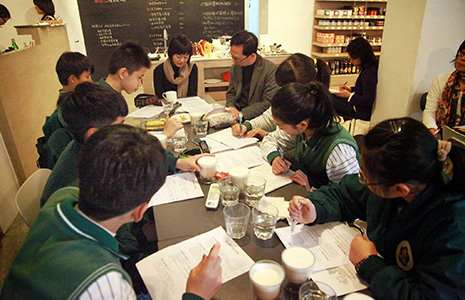 |
|
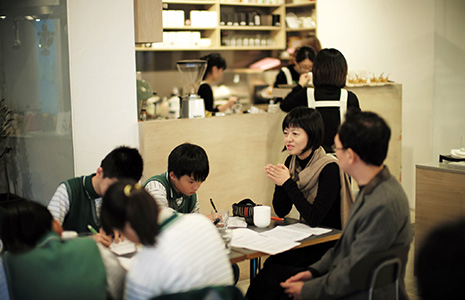 |
| |
|
|
Q5. You have tasted so many delicious foods in the world, but why do you still love the food in Taiwan? What are the characteristics of the food in Taiwan? Do you think the Taiwanese cuisine can shine in the international community? (Tsai-chen)
A5. Taiwan has good agricultural technology, the food in Taiwan has its own characteristics, and the dishes are presented in a simple way. These are the reasons that I love Taiwanese food. The characteristic of Taiwanese food is that it is simple, original, plain and has the local flavor. Taiwan suffered from long-term colonization in history, without imperial palace and royalty, so the dishes in Taiwan are very folk and ordinary, unlike the luxurious French cuisine. Therefore, I feel there is still a distance for the Taiwanese cuisine to shine in the international community. But the fine cuisine in the world is now focusing on presenting the original flavor of food, so the ingredients in Taiwan might have a bright future.
Q6. There are many food safety problems in Taiwan, how do you eat well? How do you select your ingredients? Will you make food by yourself if you cannot find the right ingredient? (Tsai-chen)
A6. I am very prudent in the food I eat, and I trace the origin of ingredients. I want to know where it is planted, by whom, and whether planted on the friendly land. If I am not satisfied to the ingredients in the market, I would ask the factory to make the food that meet my standards, such as rice noodle made from 100% rice.
Q7. Comparing to other countries, do you think that the fruits in Taiwan are more delicious? Can you name some representative fruits in Taiwan? ( Shu-han)
A7. I think Taiwanese fruits are number one in the world. The Taiwanese fruits are tasty, sweet, fragrant, unique, and even can fulfill the appetite just like desserts. The representative fruit in Taiwan should be wax apple, although it was introduced from Southeastern Asia, it was successfully improved in Taiwan. Another representative fruit is pineapple, like Pineapple No.21. At present, there are varieties of pineapples in Taiwan, with characteristic sweetness and fragrance. Besides, mango is also another representative fruit. Irwin mango is from Florida (US), but the mango planted in Taiwan is the most delicious in the world.
Q8. You are the spokeswoman of TAP in Taiwan, what are the benefits of TAP to the farmers? (Shu-han)
A8. TAP aims to trace the origin of food. Each planting step should be logged on the internet, including variety, seed, fertilization, pruning, harvest, and inspection before marketing, which can ensure that each link is done well. TAP provides a traceable channel to the public online.
| |
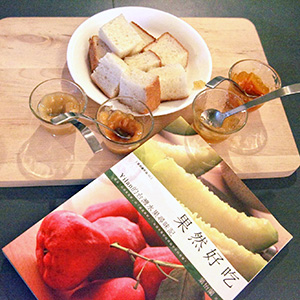 |
Q9. What are your concerns about the agriculture in Taiwan? What is you dream for the agriculture in Taiwan? (Shu-han)
A9. Taiwan is an agricultural society, but for decades, the overall development in Taiwan is focused on industry instead of agricultural. Most farms in Taiwan are small. Thus, the large foreign farms with cheap products can easily take over the local market. My dream is that we can eat the food produced on our own land, lead a comfortable life and achieve self-sufficiency. My dream to the agriculture in Taiwan is that everyone can eat the product produced in Taiwan, connect the production and sales, and link the broken food chain.
Q10. What is your favorite Red on Tree jam? How do you enjoy it?
A10. I love the red guava jam because it reminds of the old days. I like to apply the jam on my toast, add it to the black tea, or eat it with blueberry cheese.
Q11. Have you used Red on Tree jam in your cooking class? (Hui-yu)
A11. In the black tea course, I led the students to add jam into the tea to make unique fruit tea.
Q12. Based on your experiences, how do you feel about Red on Tree? Compared to foreign products, is Red on Tree competitive or does it have space for improvement? (Hui-yu)
A12. Jam making requires a large quantity of fruits and much time. Due to the fruit output and season in Taiwan, fruit shortage may occur to interrupt production. Also, there is no appropriate export channel for the jam in Taiwan. It is pitiful.
Conclusion
Although Ms. Yeh has rich experience in traveling and delicious food, for her, the most unforgettable food is the food of Taiwan. She is often moved by the ingredients in Taiwan. She thinks that the fruits of Taiwan are number one in the world. The fruits are tasty, sweet, fragrant, unique, and even can fulfill the appetite, just like desserts. She mentions different ways to enjoy jam. In recent years, many food safety problems have occurred in Taiwan. She responds by being prudent in selecting the ingredients. She makes efforts to trace the source of the ingredients, in hope that the people can know the origin of food, where it is planted, by who, and whether planted on friendly land. This is the significance of TAP. From this interview, we learned that if we choose the food carefully and trace the origin of food, we can reduce the risks of eating adulterated food. If we can build such an attitude, the illegal producers will not survive. |










